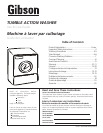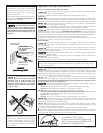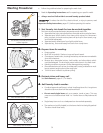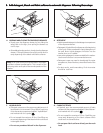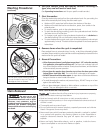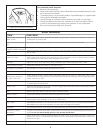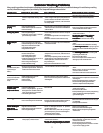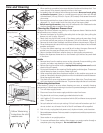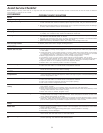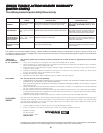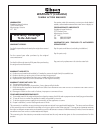
7
•Avoid overfilling detergent and fabric
softener compartments of dispenser.
•Sort items by soil level and color.
• Use correct amount of detergent, hottest
water and bleach safe for fabric.
•Use correct amount of detergent and hottest
water safe for fabric.
•
Do not pour liquid fabric softenerDo not pour liquid fabric softener
Do not pour liquid fabric softenerDo not pour liquid fabric softener
Do not pour liquid fabric softener
directly on fabric. directly on fabric.
directly on fabric. directly on fabric.
directly on fabric. See
WashingWashing
WashingWashing
Washing
Procedures Procedures
Procedures Procedures
Procedures for directions on adding
softener.
•Never pour chlorine bleach directly on
fabric.
• Check condition of items before washing.
See
Washing ProceduresWashing Procedures
Washing ProceduresWashing Procedures
Washing Procedures for preparing and
loading the wash load and adding chlorine
bleach.
•See
Washing ProceduresWashing Procedures
Washing ProceduresWashing Procedures
Washing Procedures for sorting and
preparing the wash load.
• Do not overload washer.
• Use correct temperature and amount of
detergent, water and wash time.
• Use fabric softener in the washer to lubricate
fibers.
• When ironing, use spray starch or fabric
finish on collars and cuffs.
• Turn items inside out to reduce abrasion.
• Use hottest water safe for fabric.
• Use correct water temperature and amount
of detergent.
• Use nonprecipitating water conditioner.
• Avoid overfilling detergent and fabric
softener compartments of dispenser.
• Increase water temperature using hottest
water safe for fabric.
• Do not overload washer.
• Use liquid detergent or use nonprecipitating
water conditioner with nonphosphate
granular detergent.
• Do not overload washer.
• Remove items from washer as soon as cycle
is completed.
• Use liquid fabric softener.
• Select correct wash cycle.
• Use correct amount of detergent.
• Wash synthetics frequently using hot or
warm water.
• Use nonprecipitating water softener.
• Before washing, run hot water for a few
minutes to clear lines.
• Drain water heater occasionally.
• For an ongoing problem, install an iron filter
in your water supply system.
Common WCommon W
Common WCommon W
Common W
ashing Prashing Pr
ashing Prashing Pr
ashing Pr
oblemsoblems
oblemsoblems
oblems
SOLUTIONSSOLUTIONS
SOLUTIONSSOLUTIONS
SOLUTIONS
PROBLEMPROBLEM
PROBLEMPROBLEM
PROBLEM
PREVENTIVE MEASURESPREVENTIVE MEASURES
PREVENTIVE MEASURESPREVENTIVE MEASURES
PREVENTIVE MEASURES
•If caused by detergent, mix 1 cup (240 ml)
white vinegar with 1 quart (.95 L) water in a
plastic container. Soak item 1 hour. Rinse.
•If caused by fabric softener, rub stains with
bar soap. Wash.
•Rewash with correct amount of detergent
and hottest water safe for fabric. Add bleach
safe for fabric.
•Treat with prewash stain remover or liquid
detergent.
• Increase detergent and water temperature.
Rewash.
•Rub fabric softener stains with bar soap.
•May be irreversible if rips, tears and seams
cannot be mended.
• Reduce load size. Rewash using correct water
temperature, water level, and amount of
detergent.
•Add nonprecipitating water conditioner to
wash water to remove detergent residue.
• Add liquid fabric softener to final rinse.
•Dry load in dryer.
•Remove lint with lint brush or roller.
•Use a lint brush or shaver to remove pills.
•Rewash in hottest water safe for fabrics.
• Use correct water temperature and amount
of detergent.
• Rewash load.
•Reduce load size.
• Rinse in cold water with liquid fabric softener
using the Perm Press or Delicate cycle.
•Soak in detergent booster or product
containing enzymes.
•Wash in hot water (120°F/49°C) using full
permanent press cycle. Increase detergent.
Add bleach safe for fabric.
•Or, treat with color remover.
• To restore discolored load of whites, use rust
remover safe for fabric.
••
••
•
Do not use chlorine bleach to removeDo not use chlorine bleach to remove
Do not use chlorine bleach to removeDo not use chlorine bleach to remove
Do not use chlorine bleach to remove
rust stains. It may intensify discoloration.rust stains. It may intensify discoloration.
rust stains. It may intensify discoloration.rust stains. It may intensify discoloration.
rust stains. It may intensify discoloration.
POSSIBLE CAUSESPOSSIBLE CAUSES
POSSIBLE CAUSESPOSSIBLE CAUSES
POSSIBLE CAUSES
Many washing problems involve poor soil and stain removal, residues of lint and scum, and fabric damage. For satisfactory washing
results, follow these suggestions provided by The Soap and Detergent Association.
• Undiluted liquid detergent or fabric
softener dispensed directly onto
fabric.
• Not enough detergent.
• Wash water temperature too low.
• Incorrect sorting.
• Not enough detergent.
•Undiluted liquid fabric softener
poured directly on fabric.
•Incorrect use of chlorine bleach.
• Unfastened zippers, hooks, buckles.
•Rips, tears and broken threads.
• Overloading the washer.
• Degradation of fabric.
• Incorrect sorting.
•Tissues left in pocket.
• Overloading the washer.
•Not enough detergent.
•Undissolved detergent has left a
residue resembling lint.
•Static cling is attracting lint.
•Load washed too long.
•Pilling is normal with synthetic and
permanent press fabrics. This is due
to abrasion from normal wear.
•Wash temperature too low.
• Not enough detergent.
•Water is hard.
• Incorrect sorting.
• Undissolved detergent.
•Some nonphosphate granular
detergents can combine with hard
water minerals to form a residue.
• Overloading the washer.
• Overloading the washer.
•Incorrect wash cycle for wash load.
• Agitation time too short.
• Wash water temperature too low.
• Not enough detergent.
•Iron or manganese in water supply,
water pipes, or water heater.
Blue stainsBlue stains
Blue stainsBlue stains
Blue stains
Discoloration,Discoloration,
Discoloration,Discoloration,
Discoloration,
grayinggraying
grayinggraying
graying
Greasy, oily stainsGreasy, oily stains
Greasy, oily stainsGreasy, oily stains
Greasy, oily stains
Holes, tears, orHoles, tears, or
Holes, tears, orHoles, tears, or
Holes, tears, or
snagssnags
snagssnags
snags
LintLint
LintLint
Lint
PillingPilling
PillingPilling
Pilling
(Fibers break off, ball
up and cling to
fabric.)
"Polka dots" "Polka dots"
"Polka dots" "Polka dots"
"Polka dots" (small
circles of lint and soil
on load after cycle
ends)
Residue or powderResidue or powder
Residue or powderResidue or powder
Residue or powder
on dark items;on dark items;
on dark items;on dark items;
on dark items;
Stiff, harsh fabrics.Stiff, harsh fabrics.
Stiff, harsh fabrics.Stiff, harsh fabrics.
Stiff, harsh fabrics.
WrinklingWrinkling
WrinklingWrinkling
Wrinkling
Yellow buildup ofYellow buildup of
Yellow buildup ofYellow buildup of
Yellow buildup of
body soil onbody soil on
body soil onbody soil on
body soil on
synthetic fabricssynthetic fabrics
synthetic fabricssynthetic fabrics
synthetic fabrics
Yellow or brownYellow or brown
Yellow or brownYellow or brown
Yellow or brown
rust stainsrust stains
rust stainsrust stains
rust stains



